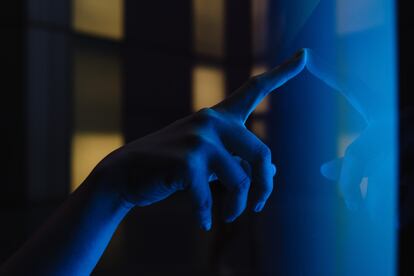Coming out of the echo chamber
The term is typically used for social media, but it can be extended to something much older: specialization

[This is an adaptation of EL PAÍS’ Tendencias (Trends) newsletter, which comes out every Tuesday.]
Let’s talk about the echo chamber, that metaphorical soundproof room in which we live today, informationally isolated from the rest of the world and where we only hear the echoes of our own voice repeated to the point of nausea. The term is usually reserved for social media, where people do nothing more than stew in their own preconceived notions, but it can be extended to a much older echo chamber we call specialization.
Specialization consists of knowing more and more about less and less until you end up knowing everything about nothing, as someone said or should have said. The complexity of the world makes it inevitable, but it remains one of the great evils of our time. All the main techno-scientific advances almost always come from people who have been able to break the bars of that cage and look beyond. This goes for pure mathematics, for computational engineering, and for the entire range of disciplines that live crowded between those two extremes. Living in the echo chamber can be pleasant, even narcotic, but it prevents us from understanding the world and finding ways to improve it.
EL PAÍS recently presented Tendencias (Trends), a futuristic initiative that takes a look at the great challenges and even greater opportunities that science, technology and knowledge are rolling out before our amazed eyes. The project got underway with a panel event where one of the speakers, the epidemiologist María Neira, not only talked about the pandemic, but also, or above all, about climate change and its serious effects on global health: asthma, cancer, expansion of the habitat of insects that carry malaria. Neira left her echo chamber to focus on problems from various angles. She is just the kind of thinker we need in our time.
Meanwhile, the architect José María Ezquiaga reflected on urban planning, but also on what the pandemic revealed to us about the limitations of the modern city and how to improve access to public services and people’s well-being. The nanotechnologist Sonia Contera, whom I had already met earlier, is a walking repository of scientific creativity based entirely on drawing links between sectors of knowledge that almost everyone perceives as watertight compartments. These are just three examples, but they are very relevant examples.
In the few days that have passed since the event, the U.S. Food and Drug Administration (FDA) has approved the first treatment based on the CRISPR genome editing technique, whose creators received the Nobel Prize just three years ago; the European Union has agreed on the first comprehensive regulation of artificial intelligence, in a marathon session that has reached a balance, admittedly an unstable one, between the protection of privacy, national security and the need for emerging European companies in the sector not to miss the boat on this groundbreaking technology; and finally, the COP28 climate conference ended with a call to transition away from fossil fuels.
Outside the echo chamber, the world is transforming at an increasingly fast speed, driven by science and technology. It’s time to break the cage.
Sign up for our weekly newsletter to get more English-language news coverage from EL PAÍS USA Edition
Tu suscripción se está usando en otro dispositivo
¿Quieres añadir otro usuario a tu suscripción?
Si continúas leyendo en este dispositivo, no se podrá leer en el otro.
FlechaTu suscripción se está usando en otro dispositivo y solo puedes acceder a EL PAÍS desde un dispositivo a la vez.
Si quieres compartir tu cuenta, cambia tu suscripción a la modalidad Premium, así podrás añadir otro usuario. Cada uno accederá con su propia cuenta de email, lo que os permitirá personalizar vuestra experiencia en EL PAÍS.
¿Tienes una suscripción de empresa? Accede aquí para contratar más cuentas.
En el caso de no saber quién está usando tu cuenta, te recomendamos cambiar tu contraseña aquí.
Si decides continuar compartiendo tu cuenta, este mensaje se mostrará en tu dispositivo y en el de la otra persona que está usando tu cuenta de forma indefinida, afectando a tu experiencia de lectura. Puedes consultar aquí los términos y condiciones de la suscripción digital.









































